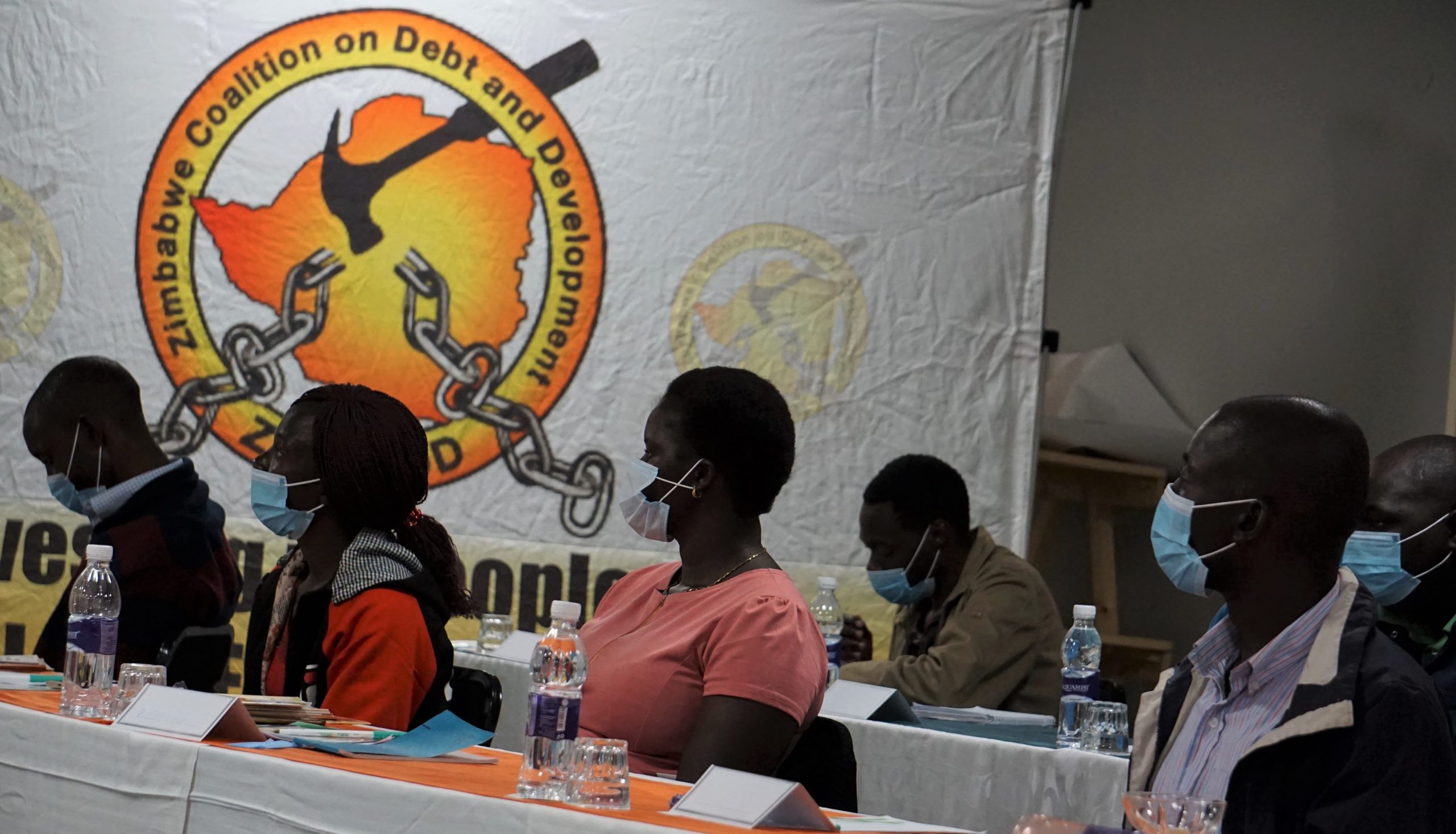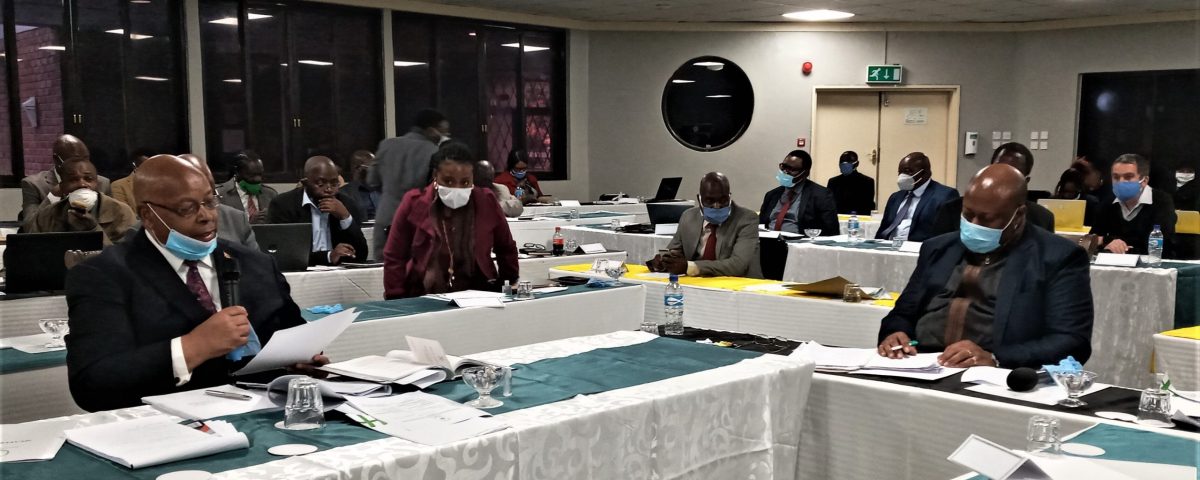
ZACC crackdown on suspected illicit diamond dealers in Mutare
August 12, 2020
Mining profits overlap community welfare, the saga continues under Covid-19
August 18, 2020AGs Office grilled to expedite editing Mines and Minerals Bill

(L-R): The speaker of Parliament Honourable Jacob Mudenda (with microphone) and Minister of Mines and Mining Development Winston Chitando (extreme right) during a workshop on the review of legislation and policies governing the mining industry in Zimbabwe held end of July in Mutare.
Martin Muleya and Ngoni Dapira
THE Zimbabwe Environmental Lawyers Association (ZELA) has cautioned Government to prioritize and speedily align the Mines and Minerals (Amendment) Bill to the Constitution, to improve the archaic laws in the existing Mines and Minerals Act.
ZELA legal officer Richard Ncube said the archaic laws in the current Mines and Minerals Act have been a drawback to mining development in the country, not only for local miners but foreign investors as well, as no one is interested in investing in an environment troubled with laws that are outdated. Adding that investment in mining has to be supported by strong legal policy frameworks.
Speaking during a Mining Policy Dialogue zoom meeting held last week Friday that was organised by Transparency International Zimbabwe (TIZ), Ncube said the Mines and Minerals Bill that is before Parliament, should guarantee certainty, clarity and policy consistency for the mining industry to thrive in the country. Especially in the wake of the strategic roadmap to achieve a $12 billion mining economy by 2023, which was launched in October last year by Government.
He said the existing mining Act was put in place in 1961 and last amended in 1996.
“Mining is a big industry in Zimbabwe with the capacity to contribute immensely to the Gross Domestic Product (GDP), but the problem we have is our laws are not aligned to the global mining and international law standards. Community participation, access to information, computerized system in the exploration data, free prior and informed consent are some of the existing laws that are not properly covered in our mining policy. Farmer-miner conflict existing law seems to favour miners as opposed to the farmers who own the land, yet there should be a balance. Zimbabwe should have laws that are not obsolete. The role of the Ministry of Mines and Mining Development should be to ensure that mining policies speak to each other,” said Ncube.
To further exacerbate the chaos in the mining industry, the Mines and Mining Development Ministry has been heavily relying on old topographical maps that are barely visible and has been struggling to make the online and integrated mining cadastre system fully operational since 2017.
Addressing on the vulnerability of the mining sector due to lack of an up to date mining policy, Ncube highlighted that community participation, access to information, a computerized system commonly known as the cadastre system, exploration of data and farmer-miner conflicts were some of the key issues yawning to be incorporated and rectified in the Mines and Minerals Bill, if Zimbabwe is to realise meaningful development from exploitation of its mineral deposits.
However, during a workshop on the review of legislation and policies governing the mining industry in Zimbabwe held end of July in Mutare, the deputy Attorney General Nelson Dias who was present at the meeting cleared the air on the reason for delays in completing the editing of the Mines and Minerals Bill citing that they are basically rewriting the Bill.
This was after the speaker of Parliament Honourable Jacob Mudenda had questioned the delays since October 2019 when the Bill was said to be near completion.
“The constitutionality of the Bill was questionable. It was so outdated, so we are basically rewriting this Bill. There has to be free constitutional justice to all consent,” said Dias, in response to the question by the Speaker of Parliament.
The Mines and Mining Development Winston Chitando who was present to jointly officially open the workshop which was for Parliamentarians in the Portfolio Committee on Mines and Mining Development and stakeholders, also supported the Attorney General’s Office on its reason for delay.
“The Bill lacked administrative justice inconsistent with the Constitution. One of the ongoing exercises by Parliament is aligning all Bills to the Constitution, so the AGs Office is on stand in terms of adopting Bills which do not address contagion effects,” said Minister Chitando.
The issue created a lot of debate, but Dias however guaranteed the portfolio committee that the AGs office intends to complete editing the Bill by end of August after an intensive two weeks retreat to work on the Bill with his team.
Hon Mudenda however urged the AGs Office to outsource expertise when overwhelmed to avoid speculation that Parliament is not doing its work timeously. “It is high time you outsource when you are overwhelmed then your role would be to do some clinical dissections. Outsource and reduce the pressure on yourselves. The University of Pretoria, Australia, Kenya, they are all good at mining laws. Let us benchmark through others then come up with our own,” said the speaker of Parliament to the AGs Office over the delays in completing editing the Bill for final approval.
During the same meting Minister Chitando also assured the Parliamentary Portfolio Committee on Mines and Mining Development that in the next 12 months a clear roadmap on the country’s cadastral system would be existing. He emphasized that the country now needs to know its current geology map to effectively exploit its vast mineral reserves.
Minister Chitando said migrating from the current manual to the more efficient and computer-based cadastre system will transform the mining industry in the country and improve on returns.
The cadastre system is a computer-based land information system containing a record showing the extent, value and ownership (or other basis for use or occupancy) of land.
“It’s a fact that our mining administration title, by the very nature that it’s manual, is not efficient and it’s also giving rise to a number of disputes. A team is being put up together with a commitment that by early 2021 the cadastre system will be up and running,” he said.
Stakeholders in the mining industry have for many years been complaining about the delays in settling pegging complaints and disputes over claim boundaries as well as delays in applying for a prospecting licence and certificate of registration and inspection. Minister Chitando said this was due to lack of capacity at provincial mining offices and Government had begun acquiring vehicles for use by these officers in the execution of their duties.
“As we speak there are 213 concessions being processed for the use it or lose it programme. 147 are at an advanced stage. All brownfield projects should be enforced by end of September and the rest by end of October,” said the Minister.


